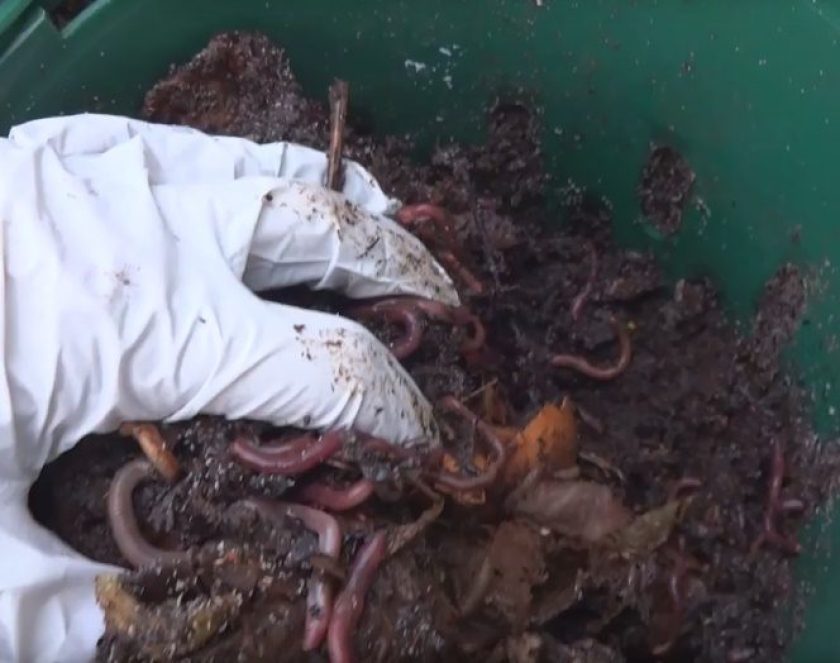Compots in winter can be quite different to how they perform in Summer depending on many variables. When I first made this video I still had a lot to learn how the Compot functions in winter so some of the info in the video is not exactly correct. For instance, I suggested that soaking your scraps will make it easy for the worms to break down. This is true if you don’t soak the waste for too long, because once it ferments, the worms won’t like it. Fermented waste is fine for the Soldier Flies but not for worms.
Everyone will have varying results depending on what they put in their pots, how often they fill them, what the microclimate is like in their garden, what the climate is like in their suburb or state, what your soil is like, what you cover your pots with, how often you water the garden or fill your pots up, and whether you are relying on just worms to decompose the food or soldier flies.
Relying on worms

Relying on worms only over winter to decompose your waste means you must selectively feed your pots and worms, only worm friendly waste. Much like you would in a worm farm. This is a much slower process over winter if the worms decide to move to a warmer part of the garden. They might stay inside your pots if the waste is providing enough heat, as it breaks down, to keep them happy. Otherwise they will move on to warmer pastures. Your waste will still continue to break down but of course will be slower.
I personally don’t have time to separate my waste into worm friendly and everything else. My waste is collected all together and tossed into the Compot all together. Bacteria and other garden critters will break down the waste as long as it is not too cold for them either. The worms will eventually move in and eat the remaining waste after it has decomposed sufficiently for them to digest it. After all – worms don’t eat waste. They eat decomposed waste. You must soak ALL your waste to ferment the waste so the worms won’t try and eat it before it has broken down enough for them to safely consume it. The fermented waste will keep them outside the pot in the soil until the waste is safe.
Speaking of worms…..Even in winter it can get too cold for worms, so your pots will have to rely on other things to break down the waste. It might also be too cold for all the other garden critters and bacteria as well. However it will eventually all break down, it will just take longer than it usually does in summer. Everything still decomposes but at a slower rate. Come spring and summer your Compots will bounce back into action when the soldier flies reappear. You can help this process along over winter by swishing your hose around inside your Compot to mix up the contents and ensure they are nice and wet. This gives it a little boost over winter to keep the contents decomposing.
Soldier Flies in winter

Soldier Flies in winter in not very common because once the temperature gets below 10°C (50°F) they will hibernate till it warms up again. Too cold or too hot may kill them (above 45°C or 113°F)
When they are not active in your pots in winter the decomposition process is considerably slower because you are relying on Bacteria, other garden critters and worms to break down the waste. Worms won’t be inside your pots if it is too cold either.
As long as you keep the contents moist over the winter period they will still break down to beautiful soil. If you have left one of your pots sit unattended over the winter period, give it a clean out before you fill it up again. If you find any undecomposed food put it back into the pot and spread the remaining soil around the garden and water in well.
Because the process is slower over winter and the Soldier Flies are not emptying your pots as they normally would, you may find that your pots will fill up with soil quicker over the winter period rather then emptying, and may need emptying sooner than they do in Summer. This will of course, vary with every Compot. I personally have not had to empty the Compot unless I have left it for a period of time without topping it up. But I am in Brisbane and we often experience quite warm winters so they don’t take as long to decompose as they might in colder parts of the country.
Having said that, I have experienced colder winters where the Soldier Flies are not around and the pots slow down dramatically. I did find that everything eventually decomposed over 3 months, which is considerably longer than summer results. Fortunately I have enough pots in the ground that I could afford to let them sit unattended for a few months while I filled up other pots dotted around the garden. There are some other things you can do over winter to get better use out of your pots. (Compoting above ground, Filling a Pot Plant Container – link these to articles)
Other ways to speed up the decomposition process

Other ways to speed up the decomposition process over winter in your Compots
- Add Banana skins, apple cores, or pork and apple sauce. These items contain enzymes that assist the decomposition process.
- Comfrey is said to be a compost activator as it breaks down very quickly releasing bacteria and nitrogen into the soil. It is generally used in open air compost piles to activate the heap and can be spread around certain plants as a source of potassium.
- Bokashi enzymes can be added also if you are really worried that your waste is not doing anything. But personally I find it is just a matter of time and everything will decompose with or without the added enzymes.
- Alternately you can add a dash of our organic Soil Conditioner to start the bacterial process off as it is full of beneficial bacteria. And if you need to attract more worms add some Vegemite, honey, cat food or chicken pellets. I just rinse out an empty honey or Vegemite jar and add it to my scraps as waste. Or you can just mix them together with water and pour around your garden
- And last but not least ADD waste water to your scraps when you rinse out an empty milk bottle or jam jar etc that is destined for the recycle bin. The scraps soaking in the waste water will soften and begin the decomposition process even before you fill your Pot.
Soaking your scraps in waste water

Soaking your scraps in waste water mingles and dilutes all the odours while making a weak nutrient solution for watering your plants before you toss your waste into your pots. This is not ideal if you have left your waste to ferment for weeks and weeks on end. I am generally too lazy to spread this water around the garden so I simply toss it all in the Compot and let it leach the nutrients into the surrounding soil all by itself. But you can pour this nutritious water around your garden if you want to before you empty the remaining waste into your pots.
Soaking your scraps in waste water also ferments the waste and will deter many dogs (but not all) if you have left the waste soaking long enough, so it is well and truly fermented. As a general rule most dogs don’t like the fermentation smell of the waste. I wonder also if the mingled odours also helps deter the dogs making it difficult for them to distinguish any particular smell. Thus it doesn’t smell like something they want to eat.
Fermenting your scraps appears to deter other wild critters like antechinus, bush turkeys, possums, racoons (in Canada) and rats. And possibly many more critters that I have not yet tested it on.
Deterring dogs

Some dogs are not deterred by anything and if they are a dog who eats their own poop they are not likely to be deterred by a little fermentation smell of the Compot. For these dogs you need to put your pots somewhere they can’t get at it, or try the above ground method in a pot that they can’t knock over or dig up. Only you know your dog.
By soaking your scraps in waste water you are also saving some water from going down the drain. Of course, you don’t have to do this. It is entirely up to you, but I find it makes a huge difference to the decomposition process in the Compot especially in winter and to deter garden critters that you don’t want in your garden or digging up your pots. Plus it stops your scraps smelling on your kitchen bench if you only empty the waste once a week like me.
Recap of rules to composting in winter
- When using worms only to decompose your waste do not soak your waste for more than 2 or 3 days
- If you are wanting Soldier Flies to decompose your waste you can soak your waste for as long as you like.
- In Winter if the Soldier Flies are not there you can still soak ALL your waste for a long time as this will make it easier for the bacteria and other garden critters to break down the waste
- Once ALL the waste has decomposed enough, the worms will move in and finish it off as long as it is not too cold for the worms who will also disappear over winter if it gets to cold outside the pot, or inside the pot.
- Because the Soldier Flies are not decomposing the waste it will be much slower over winter.
- Even in winter you need to keep the contents moist or they will dry up and not turn into friable soil.
- Therefore water you garden (and the pots) in winter also.
- Or set up an Above Ground Compot or empty as described in Making more room for waste with less pots.
Today’s did you know?

Legumes (plants that are in the Pea family eg. clover, pea, Siratro, etc) have special Bacteria growing in and on their roots. They are known as Rhizobium and are specific to a particular legume. That is, one particular Rhizobia works with one particular legume, and is not much use on any other plant, even other legumes.
This behaviour is a win/win for both the legume and the Bacteria in that the bacteria invades the legumes root hairs and feeds on the cells taking out the sugars to feed itself. BUT it also puts back into the legume root some Nitrogen that the Rhizobium has taken from air in the soil, thereby reducing the amount of Nitrogen the legume requires to be added as fertilizer. Due to the irritation by the Rhizobia the root forms a nodule on it. The nodule is usually pink indicating it is actively working.
Note: Not all nodules are caused by Rhizobia but can also be caused by the irritation of Nematodes (commonly called eel worms). This is common on Tomato roots and these are NOT good as they reduce the ability of that root to take up nutrients for the rest of the plant. These plants need to be removed so the Nematodes do not remain in the soil ready to invade other plants



















